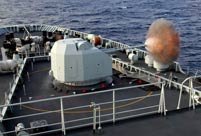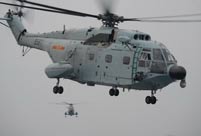 Turnip sculptures amaze tourists in Qingdao
Turnip sculptures amaze tourists in Qingdao Chinese ship formation conducts live fire training in West Pacific
Chinese ship formation conducts live fire training in West Pacific
 China comes in third at figure skating team event
China comes in third at figure skating team event
 China's teenager skater Yan shines at his Olympic debut
China's teenager skater Yan shines at his Olympic debut
 Taiwan-born actor stars on US TV series
Taiwan-born actor stars on US TV series
 Chinese Lunar New Year gift from abroad
Chinese Lunar New Year gift from abroad Chinese champions of Winter Olympic Games
Chinese champions of Winter Olympic Games  Zhang Yimou fined 7.48 mln for over-production
Zhang Yimou fined 7.48 mln for over-production
 Top 10 timeless female Chinese stars
Top 10 timeless female Chinese stars
BEIJING, Feb. 14 -- John Kerry started his second visit to China as U.S. secretary of state Friday to discuss with Chinese leaders a barrage of issues like maritime disputes in the Asia-Pacific, bilateral cooperation on climate change, the Korean Peninsula and clean energy.
This should be a good chance to cool down the tense situation in the Asia-Pacific region as his visit came amid formidable and escalating tensions between U.S. ally Japan and China.
However, before the two sides get into these topics, Kerry would probably have to do some road-block removal work.
He may have to start his statement with a clear and credible response to Washington's recent pointed criticism against China's Air Defense Identification Zone (AIDZ), and challenge of the country's nine-dash line in the South China Sea.
Moreover, during Japanese Foreign Minister Fumio Kishida's trip to Washington, the secretary of state promised again to defend its trouble-making ally in territorial disputes, an obvious breach to the nation's promised neutrality.
The United States has to know that, while Beijing has always been trying to address territorial brawls with some neighboring countries through peaceful means, it will not hesitate to take steps to secure its key national security interests according to China's sovereign rights.
To dial down the flaring regional tensions, what Washington is expected to do right at the moment is not to blame China but press Japan to call off its provocative moves.
If the United States fails to tighten the loops around the hands of the far-right politicians in Japan, and sits idly by while the ex-warmonger regains the constitutional power to wage war, no one could guarantee that similar bloody attacks such as the one on the Pearl Harbor over 70 years ago would not be repeated.
The most visionary and rewarding task the leaders in Washington and Beijing should take is to shelve their differences and carry on with their unprecedented agreement of building a new model of major-country relations.
The experiment to keep the two countries away from Thucydides's trap may be difficult and full of twists and turns, but the price of not doing it is set to be calamitously high.
Meanwhile, the two countries shared a lot of interests in denuclearizing the Korean Peninsula, promoting environmentally-friendly development and the use of green energy, and tackling the challenge of climate change.
Honestly speaking, due to the lack of mutual trust, many obstacles are still out there impeding the proceeding of a more dynamic and diversified collaboration between China and the United States. One of them is the high-tech export embargoes, which is a product of mistrust.
Thus, the success of increasing mutual trust is key to whether the two countries can avoid resting their cooperation on sand.
On trade, the two sides should work together to contain the reemergence of protectionist moves. And it would be ill-advised for the United States to employ the talks of regional free trade zone as a political weapon against the world's largest trading nation.
The selection of veteran Senator Max Baucus, who is familiar with trade and business issues with China, as the next U.S. ambassador to Beijing is a self-evident indication that the Obama administration is also ardent about a strong trade ties between the two.
As for their military cooperation, the most vulnerable part of bilateral ties, the two sides should enhance their timely and efficient communication mechanisms at all levels, both in the command centers and on the decks of a warship.
That may help avoid possible misjudgment of actions, and ensure that the near-collision of China-U.S. warships late last year would not occur in the future.
Clearly, China and the United States are the major players to shape the future of the Asia-Pacific region.
Just as what former U.S. Secretary of State Henry Kissinger said in his book "On China" that "What a culmination if ... the United States and China could merge their efforts not to shake the world, but to build it."
Therefore, it is highly hoped that Kerry's visit would help the two countries to merge their efforts to defuse the tensions, and promote regional and global stability and development over the long haul.
 Highlights of opening ceremony of Sochi 2014 Winter Olympic Games
Highlights of opening ceremony of Sochi 2014 Winter Olympic Games Highlights of Chinese New Year celebrations around the world
Highlights of Chinese New Year celebrations around the world  Chinese ship formation conducts live fire training in West Pacific
Chinese ship formation conducts live fire training in West Pacific Sanya bans skinny dipping in public beach
Sanya bans skinny dipping in public beach Top 20 most beautiful Chinese stars
Top 20 most beautiful Chinese stars  PLA navy conducts landing drills in South China Sea
PLA navy conducts landing drills in South China Sea  Snowscape in Chinese New Year
Snowscape in Chinese New Year Top 10 timeless female Chinese stars
Top 10 timeless female Chinese stars Top 10 Chinese films in 2013
Top 10 Chinese films in 2013 New Year greetings from Chinese nationals in Africa
New Year greetings from Chinese nationals in Africa Miss Chinese Int'l Pageant 2014 held in Hong Kong
Miss Chinese Int'l Pageant 2014 held in Hong Kong Severe coldness freezes large parts of China
Severe coldness freezes large parts of China  Beautiful moments of Sochi
Beautiful moments of Sochi  It's not just performing this year
It's not just performing this year Selfies of "Little colorful flag" girl unveiled
Selfies of "Little colorful flag" girl unveiled Day|Week|Month